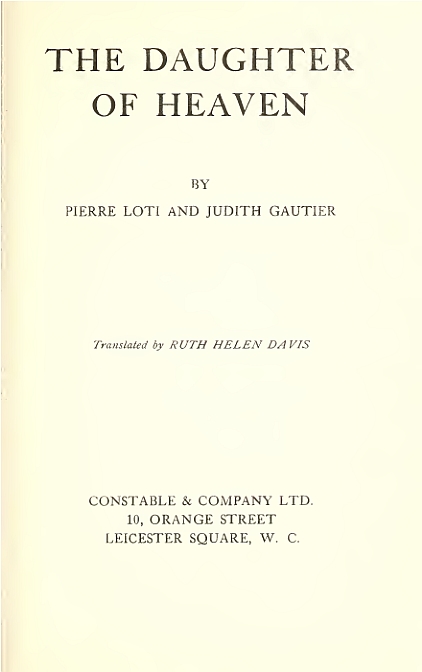

THE DAUGHTER OF HEAVEN
BY
PIERRE LOTI AND JUDITH GAUTIER
Translated by RUTH HELEN DAVIS
CONSTABLE & COMPANY LTD.
10, ORANGE STREET
LEICESTER SQUARE, W. C.
1913
PREFACE
Thoroughly to understand China, one must realize that it has for threehundred years cherished in its heart a deep and continually bleedingwound. When the country was conquered by the Manchus of Tartary, theancient dynasty of the Mings was forced to yield the throne to the Tzininvaders, but the Chinese nation never ceased to mourn the ancientdynasty nor to hope for its restoration. Revolution is therefore apermanent thing in China—a fire which smoulders eternally, breakinginto flame in one province only to be smothered and blaze out againpresently in another.
No doubt the Yellow Empire is too immense to permit of completeunderstanding among the revolutionaries, or of collective effort tobreak off the Tartar yoke. Several times, nevertheless, the Chineserace has been near to victory. When, some twenty years ago, certainevents, which Europe never really understood, brought about an upheavalin China, the revolutionaries, victorious for a time, proclaimed atNang-King an emperor of Chinese blood and of the dynasty of the Mings.His name was Ron-Tsin-Tse, which means: The Final Flowering, and bythe faithful his era was called Tai-Ping-Tien-Ko, which is as much asto say: The Empire of the Great Celestial Peace. He reigned seventeenyears, concurrently with the Tartar Emperor at Pekin and almost withinthe shadow of that city.
Later, the authorities forced a complete suppression of his history:all records of it were confiscated and burned, and men were forbidden,under penalty of death, even to utter his name. Here, however, is thetranslation of a passage relating to him which occurs in a voluminousreport addressed by the Tartar general Tsen-Konan-Wei, to the Emperorat Pekin:
"When the revolutionaries rose in the province of Chan-Tung (hesays) they possessed themselves of sixteen provinces and six hundredcities. Their guilty chief and his criminal friends had become reallyformidable. All their generals fortified themselves in the places theyhad taken, and not until they had stood three years of siege were weagain Masters in Nang-King. At this time the rebel army numbered morethan two hundred thousand men, but not one of them would surrender.The moment they perceived themselves lost they set fire to the palaceand burned themselves alive. Many of the women hanged or strangledthemselves, or threw themselves into the lakes in the gardens. However,I succeeded in making one young woman prisoner, and pressed her to tellme where the Emperor was. 'He is dead,' she replied; 'vanquished, hepoisoned himself.' But immediately the new Emperor was proclaimed inthe person of his son, Hon-Fo-Tsen. She led me to the old Emperor'stomb, which I ordered broken open. In it was found in fact theEmperor's body, enveloped in a shroud of yellow silk embroidered withdragons. He was old, bald, and had a white mustache. I caused his bodyto be burned and his ashes to be thrown to the winds. Our soldiersdestroyed all that remained within the walls: there were three days andnights of killing and pillage. However, one troop of several thousandsof rebels, very well-armed, succeeded in escaping from the city,dressed in the costumes of our dead, and it is to be feared that th